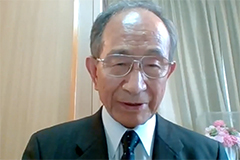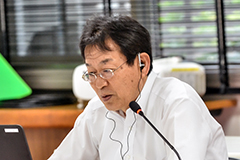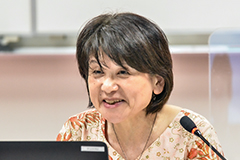Twelfth Knowledge Forum: How Do We Realize ‘Quality Growth’ in the Era of SDGs?
2022.09.08
On June 21, 2022, JICA Ogata Sadako Research Institute for Peace and Development (JICA Ogata Research Institute) hosted the 12th Knowledge Forum “SDGs and Quality Growth—Leaving No One Behind, Building Sustainable and Resilient Societies” online.
Japan’s Development Cooperation Charter, announced in 2015, sets out “quality growth” as a priority issue for the country’s development cooperation. It is also included in JICA’s mission, which was established in 2017. JICA Ogata Research Institute has continued research on quality growth as well, and as an outcome, the institute published a book titled “SDGs, Transformation, and Quality Growth: Insights from International Cooperation” in March 2022.
The webinar began with opening remarks from Takahara Akio, executive director of JICA Ogata Research Institute. Takahara noted that although economic growth has been considered essential in overcoming poverty—the most fundamental challenge for development—today, it is not only developing countries that are facing various challenges. That is, quantitative growth like GDP growth alone cannot overcome all challenges. He then remarked that quality growth, which aims to realize a world where the benefits of growth is widespread and people lead happy lives, is an important concept that offers many hints to the global community.
Hosono Akio, senior research advisor at JICA Ogata Research Institute who authored the book, gave a keynote lecture. Hosono started by explaining the relationship between the Sustainable Development Goals (SDGs), transformation and quality growth—the three keywords included in the book’s title—as follows: SDGs and quality growth are inseparable as a broad perspective on the latter is incorporated in the former; the SDGs are very closely linked to transformation as well, as seen in how the actual goals of the SDGs are called transformative goals; and while transformation is a driving force for quality growth, the realization of quality growth allows for further transformation. Hosono then spotlighted industrial development as one approach to realize quality growth, saying that industrial development and advancements in industrial structure become a driving force for transformation throughout society. He added that strategies and industrial policies from the perspective of quality growth are needed for this and that the creation of a “learning society” is crucial for economic growth. The new book shares many case studies, bearing in mind that industrial policy is the key to industrial development. Hosono mentioned the textile industry in Bangladesh and the automotive industry in Thailand as examples. He concluded that industrial policies that facilitate industrial development and transformation are important, along with ownership among the local people to understand the challenges they are facing and to address them, and mutual learning between the local people and external stakeholders, since industrial development and transformation are endogenous processes but do not progress automatically.

Hosono Akio, senior research advisor at JICA Ogata Research Institute, gave a keynote lecture
In the talk session moderated by Murotani Ryutaro, who is the head of the Office for Peacebuilding, Governance and Peacebuilding Department, JICA, two panelists commented on the book. First, Hirota Koki, visiting fellow at JICA Ogata Research Institute (also a professor at Saitama University), who has been working on the research project on quality growth commented that it is important to start the discussion by looking at the background leading to the birth of this concept. He said that quality growth is in line with global discussions which put that it is necessary to comprehensively consider wellbeing because economic development goals are overly focused on income (GDP). Hirota then added that quality growth is a growth strategy concept that Japan would like to propose based on its own experience. In order to spread it globally, the theory, indices and methodology are necessary. He concluded by saying that this book provides viral narratives that can be widely influential, especially in terms of methodology. Next, Ohno Izumi, senior research advisor at JICA Ogata Research Institute and professor at the National Graduate Institute for Policy Studies (GRIPS), highly praised this book, commenting that it presents concrete and diverse options for development strategies for developing countries in the era of SDGs. Ohno added that based on the wealth of case studies of Japan’s development cooperation, the book is full of practical knowledge of “how” aspects viewed from both recipients and donors.

Hirota Koki, visiting fellow at JICA Ogata Research Institute, participated in the talk session
Murotani then asked the panelists about the roles of international cooperation, Japan and JICA, to help countries realize all three elements of quality growth, inclusiveness, sustainability and resilience, simultaneously. Hosono answered that there are three approaches to accommodate both growth and these three elements in international cooperation: i) a growth approach that brings good synergy, where the more we aim for the realization of the three elements, the more growth follows; ii) an approach in which the three elements are incorporated in industrial policies from the start; and iii) an approach in which income from the growth of industries that find it difficult to balance the three elements and growth are used for policies to enhance the three elements. Hirota responded by saying that given the limitation of conventional development models, the role of technical cooperation is increasingly important and it is useful that JICA presents models of development cooperation that have been successfully implemented in various countries as good narratives and spread them. He added that it may be effective to incorporate the perspective of quality growth, in particular, that of equity, in the selection criteria and design of each individual project. Ohno responded by saying that based on good understanding of the reality of each counterpart, JICA should serve as a facilitator for sharing knowledge of experiences in development of Japan and other countries. Japan should identify and collaborate with people and networks that will be drivers of change, while considering inclusiveness and resilience in a cross-sectoral manner at the “meso-level” (for example, in the industrial structure) in the country-specific approach.

Ohno Izumi, senior research advisor at JICA Ogata Research Institute, participated in the talk session
In the Q&A session, the panelists answered questions from the floor. Lively discussions took place over topics such as the difference between the concept of growth in the SDGs era and that of the previous era, bearing in mind that whether growth alone is not enough has been debated for a long time.

事業事前評価表(地球規模課題対応国際科学技術協力(SATREPS)).国際協力機構 地球環境部 . 防災第一チーム. 1.案件名.国 名: フィリピン共和国.

事業事前評価表(地球規模課題対応国際科学技術協力(SATREPS)).国際協力機構 地球環境部 . 防災第一チーム. 1.案件名.国 名: フィリピン共和国.

事業事前評価表(地球規模課題対応国際科学技術協力(SATREPS)).国際協力機構 地球環境部 . 防災第一チーム. 1.案件名.国 名: フィリピン共和国.

事業事前評価表(地球規模課題対応国際科学技術協力(SATREPS)).国際協力機構 地球環境部 . 防災第一チーム. 1.案件名.国 名: フィリピン共和国.

事業事前評価表(地球規模課題対応国際科学技術協力(SATREPS)).国際協力機構 地球環境部 . 防災第一チーム. 1.案件名.国 名: フィリピン共和国.
scroll